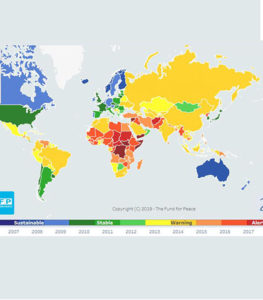Fragility found in some surprising places
A politically tumultuous year across the globe has seen some surprising developments in the stability of nation states as Brexit and the Trump presidency continue to stumble from one crisis to the next.
But the clear trend found in the ‘Fragile States Index’ (FSI) for 2018 was that, on the whole, most countries around the world continue to show signs of steady improvement.
The FSI is an annual report published by the US-based think tank the Fund for Peace and the American magazine Foreign Policy which list countries according to their capacity and legitimacy.
This year, the most fragile states listed are South Sudan, Somalia, Yemen, Syria and the Central African Republic while the least fragile states are Finland, Norway, Switzerland, Denmark and Iceland.
Australia is the eighth least fragile state. The United States sits at 154 in a list of 178 and the UK at 159.
The country that fell most into fragility was Qatar which has suddenly become politically, economically and physically isolated from its neighbours.
The world’s wealthiest country per capita saw a move by regional neighbours Saudi Arabia, Bahrain, and the United Arab Emirates to impose a political and economic blockade on the small Gulf nation that has exacted a significant toll on Qatar’s stability, the FSI report says.
Three of the ten most-worsened countries for 2018 are also among the world’s most developed: Spain, the United States, and the United Kingdom, each of whom are experiencing deep internal political divisions, it says.
As the second most-worsened country in 2018, Spain was hit by increased internal instability as the Catalonia region held an independence referendum that was, arguably, met by a clumsy response from the central government in Madrid that likely intensified the problem.
As the Spanish state sought to crack down on the separatist referendum – even resorting to violence in some cases – support for a separate Catalan state appeared to surge in defiance of Madrid’s response.
The US has experienced significant political upheaval recently, and as a result has ranked as the fourth most-worsened country for 2018.
Despite a reasonably strong economy, there has been social and political instability.
Observers of Washington have noted a growing extremism in American society and politics, with an increasingly disenfranchised political centre, the FSI report says.
The FSI backs this up and on the ten-year trend of indicators of cohesion, the United States is the most-worsened country in the world.
The FSI data shows a similar story in the UK which is the third-most worsened country in the world for those same indicators of cohesion since 2013.
The Brexit referendum came amid unprecedented levels of division and group grievance among Britain’s social and political sphere, the data shows.
The FSI report says that even for developed nations, divisive policy-making and rhetoric is simply incompatible with a country’s ability to thrive.
Among the other most-worsened countries for 2018 are Yemen and Syria, both stuck in prolonged civil conflicts that continue to worsen.
Venezuela ranks as the third most-worsened country in 2018 as the country spirals into chaos under the mismanagement of the Maduro government that is also tightening its grip on power.
In the 2017 Fragile States Index, Mexico was one of the most-worsened countries for the preceding year, fuelled by economic concerns, widespread violence and heightened uncertainty over its relations with the United States.
But Mexico has bounced back and is the sixth most-improved nation in 2018, the FSI report says.
This improvement has been driven by economics. Mexico has worked to diversify its trade relationships throughout Latin America and with Europe.
Meanwhile, the country has experienced significantly less pressure from Central American migrants transiting through Mexico to its northern border,
As 2019 goes by, conflict continues in Syria and Yemen.
Peace deals are falling apart in several parts of Africa and fractious politics continue to beset the United States, United Kingdom, and parts of Europe.
“It is… incumbent upon policy-makers, influencers, and practitioners to understand and heed the warnings of short- and long-term trends, to be mindful of the growing potential for the conditions of instability, and to take action to prevent or mitigate such deterioration,” the FSI report says.
“But as much as the world may overall be improving, more than anything else the FSI demonstrates that stability can never be taken for granted – even in the world’s richest and most developed countries,” it says.
See the full list https://en.wikipedia.org/wiki/List_of_countries_by_Fragile_States_Index
Laurie Nowell
AMES Australia Senior Journalist












